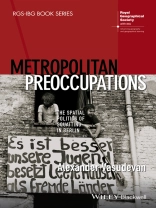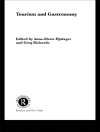In this, the first book-length study of the cultural and political
geography of squatting in Berlin, Alexander Vasudevan links the
everyday practices of squatters in the city to wider and enduring
questions about the relationship between space, culture, and
protest.
* Focuses on the everyday and makeshift practices of squatters in
their attempt to exist beyond dominant power relations and redefine
what it means to live in the city
* Offers a fresh critical perspective that builds on recent
debates about the 'right to the city’ and the role of
grassroots activism in the making of alternative urbanisms
* Examines the implications of urban squatting for how we think,
research and inhabit the city as a site of radical social
transformation
* Challenges existing scholarship on the New Left in Germany by
developing a critical geographical reading of the
anti-authoritarian revolt and the complex geographies of connection
and solidarity that emerged in its wake
* Draws on extensive field work conducted in Berlin and elsewhere
in Germany
Spis treści
Series Editors’ Preface viii
List of Figures ix
Acknowledgements xi
1 Introduction: Making Radical Urban Politics 1
2 Crisis and Critique 27
3 Resistance and Autonomy 53
4 Antagonism and Repair 86
5 Separation and Renewal 133
6 Capture and Experimentation 164
7 Conclusion: 'Der Kampf geht weiter’ 196
References 209
Index 231
O autorze
Alexander Vasudevan is Assistant Professor of Cultural
and Historical Geography at the University of Nottingham, UK. A
co-editor of Practicing the Archive: Reflections on Method
and Practice in Historical Geography (with E. Gagen and H.
Lorimer, 2007) his work has been published in several prestigious
journals, including Antipode, Cultural
Geographies, Environment and Planning
A and D, Progress in Human
Geography, and Social and Cultural
Geography. His current research focuses on radical
politics, urban squatting and the wider geographies of contemporary
precarity.












